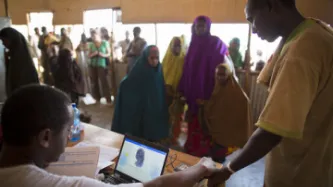Search
Content type: News & Analysis
Privacy International (PI) has today filed complaints with the Information Commissioner (ICO) and Forensic Science Regulator (FSR) against the UK Home Office's use of GPS ankle tags to monitor migrants released on immigration bail. This policy and practice represents a seismic change in the surveillance of migrants in the UK. PI was first alerted to this scheme by organisations such as Bail for Immigration Detainees, an independent charity that exists to challenge immigration detention in the…
Content type: Advocacy
Today, PI filed a complaint with the Forensic Science Regulator (FSR) in relation to quality and accuracy issues in satellite-enabled Global Positioning System (GPS) tags used for Electronic Monitoring of subjects released from immigration detention (GPS tags). We are concerned there may be systemic failures in relation to the quality of data extracted from tags, processed and interpreted for use in investigations and criminal prosecutions.
The GPS tags are used by the Home Office to…
Content type: Report
Privacy International’s submissions for the Independent Chief Inspector of Borders and Immigration inspection of the Home Office Satellite Tracking Service Programme
The Home Office have introduced 24/7 electronic monitoring and collection of the location data of migrants via GPS ankle tags. This seismic change cannot be overstated. The use of GPS tags and intention to use location data, kept for six years after the tag is removed, in immigration decision-making goes far beyond the mere…
Content type: News & Analysis
The “EU Trust Fund for Stability and Addressing Root Causes of Irregular Migration and Displaced Persons in Africa” (EUTF for Africa) isn’t exactly headline news (and nor does it exactly roll off the tongue), but its influence is vast and will be felt for decades to come for millions of people across Africa.
Set up in the wake of the 2015 ‘migration crisis’ in Europe and largely made up of money earmarked for development aid (80% of its budget comes from development and humanitarian aid funds…
Content type: Long Read
Dear Sir/Madam,
Freedom of information act request
RE: Social media monitoring / social media intelligence
FOIA REQUEST
For definition of social media intelligence please see background explanation below. We further note the comments of the Office of Surveillance Commissioners Annual Report 2016 cited below.
1. In 2016 the Rt Hon Lord Judge, then Chief Surveillance Commissioner, wrote to all Local Authorities regarding use of social media in investigations. Please confirm whether you are…
Content type: Long Read
The Chief Surveillance Commissioner, The Rt Hon Sir Christopher Rose’s Annual Report 2011 - 12 did not refer to social networks but to overt investigations using the internet as a surveillance tool, stating that:
“5.17 A frequent response to my Inspectors’ enquiries regarding a reduction in directed surveillance is that ‘overt’ investigations using the Internet suffice. My Commissioners have expressed concern that some research using the Internet may meet the criteria of directed…
Content type: News & Analysis
Photo by Sharon McCutcheon on Unsplash
In May, the United Nations Special Rapporteur on extreme poverty and human rights, Philip Alston invited all interested governments, civil society organisations, academics, international organisations, activists, corporations and others, to provide written input for his thematic report on the human rights impacts, especially on those living in poverty, of the introduction of digital technologies in the implementation of national social protection…
Content type: Advocacy
Refugees are among the most vulnerable people in the world. From the moment they flee their homes, as they pass through 'temporary' places such as refugee camps and detention centres to their 'final' destinations, they are continuously exposed to threats. In the digital age, these threats are increasingly being driven by the processing of vast amounts of highly sensitive personal data: from enrollment and registration processes needed for them to access services, to their identification and…







